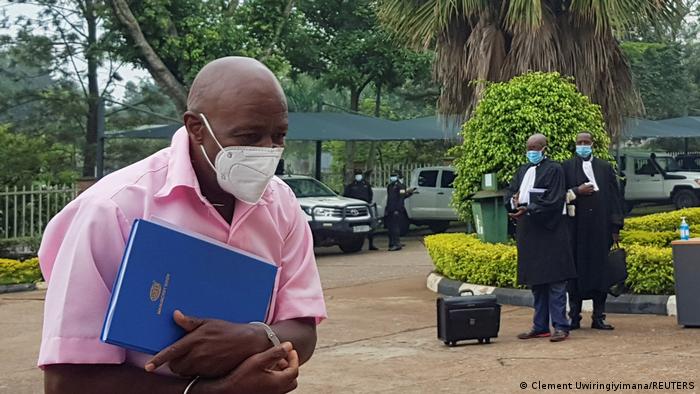The US House of Representatives intelligence committee will this Wednesday July 27 hold a hearing at which Rwanda’s intelligence operations will be the topic of the day.
As usual, political theatrics and xenophobia will be on display. Facts about Rwanda will be left out, as speaker after another rumbles with fabrications meant to advance political agendas, not solve anything.
The speakers will tell the world that Paul Rusesabagina’s terrorist activities are actually those of a political activist. The victims of his rebel group will not be mentioned anywhere.
As recently as June 18, Saturday afternoon at around 14:00hrs, armed thugs, suspected to be remnants of FLN operating from across the border, shot at a public passenger bus on the Nyungwe-Rusizi road in Nyungwe forest, in Nyamagabe District.
The National Liberation Front (FLN) is the armed wing of Rwandan Movement for Democratic Change (MRDC) led by Paul Rusesabagina. The group is responsible for several attacks against civilians and passenger buses transiting through the Nyungwe forest highway.
This time, again, the security forces foiled another of what could have been a deadly day of mayhem like it happened in 2018. A total of 102 people were affected, some killed, others left with lifelong injuries, and many lost property they had worked for years to accumulate.
Several other potential attacks have been stopped, which couldn’t have been possible without a proactive security apparatus.
In the latest foiled attack, the assailants killed the bus driver, and one passenger, and also injured six other passengers who were evacuated to Kigeme Hospital and university teaching hospital in Butare (CHUB) for treatment.
The sole reason why the FLN terrorists were not able to freely enter Rwanda from their hideout in regional neighbors, is that they have been contained.
Intelligence gathering, or call it spying, is as old as written history. Excavations at the palace of the ancient city of Mari in modern Syria, for example, have produced an archive filled with evidence of the shadow trade, dating to around 1800 B.C.E. The use of spies for both political and military espionage was quite common, and evidence of ancient recruiting techniques is plentiful.
All states carry out intelligence gathering. Why, otherwise, would the US Congress have intelligence committees?
Effective intelligence gathering by Rwanda has enabled government to create a safe haven for it’s people and the growing number of visitors.
In January, Usebounce, a luggage storage firm, ranked Rwanda sixth safest place globally and top in Africa for solo travellers. The firm created the ranking by combining a crime index and a safety index to evaluate where solo travellers would feel safest.
Rwanda has been featuring every year as one of the safest countries in the world as per Gallup’s Global Law and Order index.
The annual index ranks Rwanda among top 15 globally and among top five in Africa, with over 80 per cent of citizens saying that they feel safe and confident in the security organs.
These are just two examples, testament to how effective the security forces have kept the country safe, despite Rwanda being in a lawless region. Barely 200km from Rwanda’s border, inside DR Congo, there are countless militia groups roaming its dense jungles, including Rwandan groups.
No other country does surveillance and intelligence gathering more than the United States. I don’t have to look far.
The infamous WikiLeaks cables gave us rare insight into American embassy staff, who otherwise fashion themselves as diplomats to enjoy immunity from scrutiny, to run a global information gathering apparatus.
Thanks to Edward Snowden, the world now knows the National Security Agency (NSA).
It has been confirmed, which is what critics have long suspected—that the NSA, a component of the Defense Department, is engaged in unconstitutional surveillance of Americans’ communications, including their telephone calls and emails.
The large trove of leaked documents showed that the NSA is conducting sweeping surveillance of Americans’ international communications, that it is acquiring many purely domestic communications as well, and that the rules that supposedly protect Americans’ privacy are weak and riddled with exceptions.
We now know the telephone of former German Chancellor Angela Merkel had been tapped. Former President Jacques Chirac wasn’t spared. Current leader Emmanuel Macron had to change his phone when news broke that that his had also been hacked.
The US government has all the right to be collecting as much Intelligence as possible, similarly does Rwanda.
President Paul Kagame has a mandate to do whatever is provided by the powers vested in him by the Constitution of Rwanda to keep Rwandans safe. As their leader, the voters don’t expect explanations after their loved ones have been impacted, they want to see tangible results.
Going by the current state of affairs; it is safe to say President Kagame has ticked all the right security and peace boxes.
In any case, Rwanda should double intelligence gathering if that’s what It takes to stop Rusesabagina’s rebels et allfrom destabilizing the country.
source: www.newtimes.co.rw










